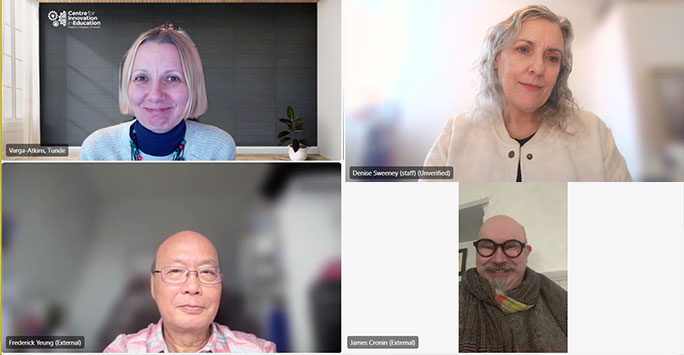Treasure Island Pedagogies: Episode 37, the one with the Circular Time
Posted on: 20 January 2025 by Dr Tunde Varga-Atkins in General

In Episode 37, our discussion covered enhancing small group discussions in online learning, using exploratory talk to foster collaboration, and leveraging visual arts to develop communication skills in medical education. We also explored the power of storytelling and case studies in engaging diverse learners and the educator’s role in moderating discourse and fostering dialogue. These approaches were connected to broader themes such as intellectual moderation, multimodal communication, and the holistic integration of knowledge, emotion, and interaction in education.
Speakers: Denise Sweeney, Frederick Yeung, James Cronin
Date: 20 January 2025
Treasure Island Pedagogies: Episode 37 podcast
(Treasure Island Pedagogies Episode 37 - Podcast Transcript)
Read or listen to find out our guests’ lightbulb moments, teaching props, pedagogies and luxury items that they would take to their Treasure Islands for precious contact time with students.
Education is a constantly evolving landscape, and Episode 37 of Treasure Island Pedagogies brings together insightful reflections on how teaching strategies can enhance student learning. Here, Denise Sweeney, Frederick Yeung, and James Cronin share their experiences in fostering engagement, communication, and collaboration in diverse educational contexts.
Denise Sweeney
- Original discipline: Arts - French and Drama/Film
- Current Role:Associate Professor, School of Education, University of Nottingham
- Lightbulb moment: During the pandemic, we had to move our postgraduate certificate course from face-to-face to fully online. The biggest challenge was small group discussions—some students loved it, but others found it difficult due to technology or linguistic barriers. I started using Neil Mercer's exploratory talk framework to scaffold discussions, making the process more explicit. This approach helped students understand why discussions matter and how to engage effectively.
- Teaching Prop or Pedagogy: Exploratory talk techniques—helping students understand what makes a great small group discussion and how to co-construct knowledge rather than just receiving information.
- Luxury item:A collection of Jean-Luc Godard’s films, particularly Histoire(s) du cinéma. His way of using images and text together fascinates me, and I’d love to explore it further.
Frederick Yeung
- Original discipline: Mental Health/Psychiatric Nursing
- Current Role: Senior lecturer teaching Master of Healthcare Leadership
- Lightbulb moment: I've always been interested in how students engage, especially international students who may not be used to active participation. Teaching mental health nursing, I found that storytelling and experiential learning were the most effective ways to help students connect with abstract concepts. Case studies and scenarios allow students to reflect critically and develop deeper empathy.
- Teaching Prop or Pedagogy: Case studies and storytelling—I use real-world scenarios to encourage students to think beyond the textbook and connect emotionally with their learning.
- Luxury item: A collection of impactful student success stories—hearing how students grow and apply their learning is incredibly rewarding and keeps me motivated.
James Cronin
- Original discipline: History, English, SoTL, Broadcast Journalism.
- Current Role: College lecturer in teaching and learning.
- Lightbulb moment: One of the biggest influences on my teaching was my late colleague, Professor Tony Ryan. He taught me the power of visual thinking and open-ended questioning. He would take medical students to an art gallery and ask them, ‘What do you see? Why do you say that? What more do you see?’ This method trained them to observe, listen, and think critically—essential skills for a patient-centered approach to medicine.
- Teaching Prop or Pedagogy: Visual arts and dialogue-based learning—I believe communication isn’t just about language but also silence, body language, and listening.
- Luxury item: Mirrors by Eduardo Galeano. It’s a book full of short, powerful historical narratives with built-in contradictions—perfect for reflecting on the complexity of knowledge and human experience.
Any Sparks? How Might Our Joined-Up Treasure Islands Look Like?
Throughout our discussion, we found common ground in multimodal communication, collaborative knowledge-building, and fostering nuanced dialogue. As educators, we play a crucial role in moderating discussions, balancing intellectual engagement, and encouraging constructive disagreement. Imagine a learning environment that blends storytelling, structured dialogue, and visual thinking—an approach that nurtures critical thinking, empathy, and deeper student engagement.
Facilitated by Dr Tünde Varga-Atkins, Sound: Chris Loxham/Sandra Samaca, Web design: Dennis Wong, Neil Murray @LivUniCIE
Keywords: Treasure Island Pedagogies, Podcast, Innovation, Education, Storytelling, Multimodal Communication, Case-Based Learning, Reflective Practice.